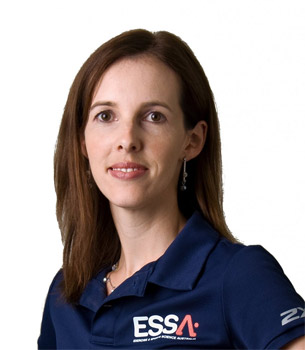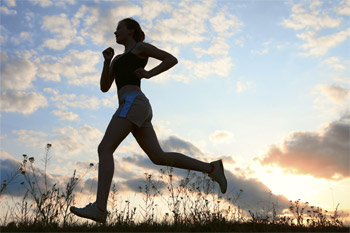Anita Hobson-Powell Cancers Linked To Lack Of Exercise Interview

Anita Hobson-Powell Cancers Linked To Lack Of Exercise Interview
Australia has the 8th highest cancer level for women in the world according to the World Cancer Research Fund International.
'When you look at what the top five cancers are for Australian women, breast and colorectal cancers are prominent. Both of these cancers can be linked back to a lack of exercise," says Anita Hobson-Powell, Executive Officer of Exercise and Sports Science Australia.
Australia has the 13th highest rate of breast cancer and is 8th in the world for forms of colorectal cancer.
'Since the first report linking physical inactivity and cancer risk in 1922, there have been hundreds of reports that show the direct link between this relationship. Scientific evidence supporting physical activity is now considered -strong' and -convincing' for breast and colon/colorectal cancers."
'We hear every day that people are just not moving enough, according to the Australian Bureau of Statistics only 43% of adults actually met the "sufficiently active" threshold," says Anita.
'What we find even more alarming is the fact that exercise is still not recognised as an essential part of cancer rehabilitation and standard care."
Physical activity during or following cancer treatment can help with:
Improves cardiovascular function
Improves body composition (increase muscles mass, decreases body fat)
Improves body image, self esteem and mood
Reduces the number and severity of side effects (nausea, fatigue and pain)
Reduces hospitalisation duration
Improves chemotherapy completion rates
Reduces stress, depression and anxiety
'Findings have also shown that participation in physical activity reduces the risk of recurrence and death by up to half, when compared with those who are sedentary," says Anita.
There are limited programs available in Australia that focus on the psychosocial and physical concerns of cancer patients, and those that do focus on exercise fall well below what current research recommends.
'Physical inactivity is responsible for 14% of colon cancers and 11% of post-menopausal breast cancer. Couple this with the positive effect exercise has on recovery from these cancers, it leaves us scratching our heads – why are we not moving more?" says Anita.
Accredited Exercise Physiologists (AEPs) can play a key role in rehabilitation and can influence public health through the prescription of exercise. To contact your local AEP visit www.essa.org.au or for public factsheets visit www.exerciseismedicine.org.au
Interview with Anita Hobson-Powell
Question: Did it surprise you to hear that Australia has the eighth highest cancer level for women in the world?
Anita Hobson-Powell: No it didn't surprise me, unfortunately we hear all too often about people we know being diagnosed.
 Question: Why do you think Australians are not exercising enough and how can we change this?
Question: Why do you think Australians are not exercising enough and how can we change this?
Anita Hobson-Powell: We, in particular women, are often too busy juggling work and family and not taking time out of our day to look after ourselves. We can start to change this by not feeling bad about allocating 30 minutes a day to doing something that will make us feel good, like going for a walk. It'll not only help prevent a number of chronic diseases but it will provide stress release, and clear the head.
Question: Are all cancers linked back to a lack of exercise?
Anita Hobson-Powell: No, not all cancers are linked to lack of exercise.
Question: Which cancers are highly associated with a lack of exercise and why?
Anita Hobson-Powell: It's been found, Colon Cancer and Breast Cancer have a high association with a lack of physical inactivity.
Question: How much and what exercise should we be doing, per week?
Anita Hobson-Powell: ESSA recommends the American College of Sports Medicine Guidelines for 65 year olds and under http://exerciseismedicine.org.au/wp-content/uploads/2012/03/PA-guidelines-under-65-v2.pdf
Question: Does regular exercise help prevent cancer? If so, how?
Anita Hobson-Powell: Exercise improves our general health and wellbeing regardless, however regular exercise may decrease hormone levels and thus help to lower breast cancer risk. Researches have proposed that exercise may prevent tumour development by lowering hormone levels, lowering insulin levels, and insulin-like growth factor, and assisting with weight management.
Question: How important is exercise for cancer patients and those recovering from cancer?
Anita Hobson-Powell: Exercise is extremely important to our health and wellbeing, particular for cancer patients both suffering and recovering. Exercise will help to decrease any side effects of surgery and help get you back to your usual activities. If you have had cancer and starting an exercise program, you must firstly be assess by an Accredited Exercise Physiologist. They will consider your exercise history, the timing with respect to diagnosis, and the presence and intensity of treatment-related side effects. Supervision is recommended during active treatment, when the frequency and type of side effects are likely to fluctuate. http://exerciseismedicine.org.au/wp-content/uploads/2011/10/Breast-Cancer.pdf
Question: What type of exercise would you recommend for cancer patients?
Anita Hobson-Powell: Take a look at http://exerciseismedicine.org.au/wp-content/uploads/2011/10/Breast-Cancer.pdf for recommended exercises for cancer patients. Low intensity aerobic is a good starting point.
Question: What message would you like Australian women to take from this interview?
Interview by Brooke Hunter
MORE
- Chiropractic Myths & Truths
- Gerard Fogarty Arthritis and Knee Replacement...
- Kym Ellery The ELLERY Eyewear Collection Interview
- Dr Ross Walker The Real Modern Killers Interview
- Shelly Horton Hay Fever Help Interview
- Sebastian VanVeenendaal Royal Rehab's Beach...
- Abigail Koch Family Private Health Insurance...
- Monique Cashion Organic Awareness Month Interview
- Dr Bill Harris Omega-3s Interview
- The Top Ten Health Myths Busted
- Professor Bolin IBD Management a Life-Long...
- Anthia Koullouros Best Cold and Flu Defence...
- Leprosy in NSW
- Julie-Anne Mitchell Go Red for Women Healthy...
- Insight into Chronic Disease Hospitalisations...
- Jeff Chan Mobile Phone Allergies Interview
- How to Conquer Bad Winter Health Habits
- Bad Cholesterol Behind Cancer Spreading In Body
- New Screening Test Recommended To Help Prevent...
- Support For The Rural Nurse Workforce A...
- Kathy Nielsen Ovarian Cancer Australia National...



